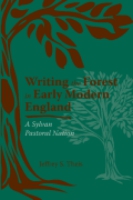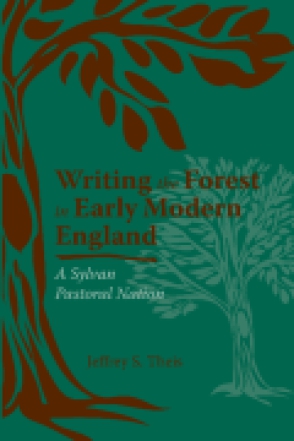Writing the Forest in Early Modern England
A Sylvan Pastoral Nation
Jeffrey S. Theis
In Writing the Forest in Early Modern England: A Sylvan Pastoral Nation, Jeffrey S. Theis focuses on pastoral Literary Studies in early modern England as an emerging form of nature writing. In particular, Theis analyzes what happens when pastoral writing is set in forests—what he terms sylvan pastoral. During the sixteenth and seventeenth centuries, forests and woodlands played an instrumental role in the formation of individual and national identities in England. Although environmentalism as we know it did not yet exist, persistent fears of timber shortages led to a larger anxiety about the status of forests. Perhaps more important, forests were dynamic and contested sites of largely undeveloped spaces where the poor would migrate in a time of rising population when land became scarce. And in addition to being a place where the poor would go, the forest also was a playground for monarchs and aristocrats where they indulged in the symbolically rich sport of hunting. Conventional pastoral Literary Studies, then, transforms when writers use it to represent and define forests and the multiple ways in which English society saw these places. In exploring these themes, authors expose national concerns regarding deforestation and forest law and present views relating to land ownership, nationhood, and the individual’s relationship to nature. Of particular interest are the ways in which cultures turn confusing spaces into known places and how this process is shaped by nature, history, gender, and class. Theis examines the playing out of these issues in familiar works by Shakespeare, such as A Midsummer Night’s Dream, The Merry Wives of Windsor, and As You Like It, Andrew Marvell’s “Upon Appleton House,” John Milton’s Mask and Paradise Lost, as well as in lesser known prose works of the English Revolution, such as James Howell’s Dendrologia and John Evelyn’s Sylva. As a unique ecocritical study of forests in early modern English Literary Studies, Writing the Forest makes an important contribution to the growing field of the history of environmentalism, and will be of interest to those working in literary and cultural history as well as philosophers concerned with nature and space theory.
- Description
- Bio
- Subjects
In Writing the Forest in Early Modern England: A Sylvan Pastoral Nation, Jeffrey S. Theis focuses on pastoral Literary Studies in early modern England as an emerging form of nature writing. In particular, Theis analyzes what happens when pastoral writing is set in forests—what he terms sylvan pastoral. During the sixteenth and seventeenth centuries, forests and woodlands played an instrumental role in the formation of individual and national identities in England. Although environmentalism as we know it did not yet exist, persistent fears of timber shortages led to a larger anxiety about the status of forests. Perhaps more important, forests were dynamic and contested sites of largely undeveloped spaces where the poor would migrate in a time of rising population when land became scarce. And in addition to being a place where the poor would go, the forest also was a playground for monarchs and aristocrats where they indulged in the symbolically rich sport of hunting. Conventional pastoral Literary Studies, then, transforms when writers use it to represent and define forests and the multiple ways in which English society saw these places. In exploring these themes, authors expose national concerns regarding deforestation and forest law and present views relating to land ownership, nationhood, and the individual’s relationship to nature. Of particular interest are the ways in which cultures turn confusing spaces into known places and how this process is shaped by nature, history, gender, and class. Theis examines the playing out of these issues in familiar works by Shakespeare, such as A Midsummer Night’s Dream, The Merry Wives of Windsor, and As You Like It, Andrew Marvell’s “Upon Appleton House,” John Milton’s Mask and Paradise Lost, as well as in lesser known prose works of the English Revolution, such as James Howell’s Dendrologia and John Evelyn’s Sylva. As a unique ecocritical study of forests in early modern English Literary Studies, Writing the Forest makes an important contribution to the growing field of the history of environmentalism, and will be of interest to those working in literary and cultural history as well as philosophers concerned with nature and space theory.
Jeffrey S. Theis is associate professor of English at Salem State College. He has published articles in journals such as English Literary Renaissance and Milton Studies and was a contributor to Renaissance Ecology: Imagining Eden in Milton’s England, edited by Ken Hiltner.
Mailing List
Subscribe to our mailing list and be notified about new titles, journals and catalogs.




